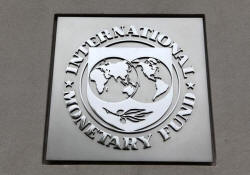|
 IMF
says financial stability risks rising, urges bank asset
repair IMF
says financial stability risks rising, urges bank asset
repair
 Send a link to a friend
Send a link to a friend
[April 13, 2016]
By David Lawder
WASHINGTON (Reuters) - World financial
markets have calmed after turmoil earlier this year, but more needs to
be done to ensure global financial stability amid slowing growth, weak
commodity prices and worries about China's economy, the International
Monetary Fund warned on Wednesday.
|
|
 The IMF said in its latest Global Financial Stability Report that
financial system risks have risen since the last report in October
and market turmoil could easily recur and intensify if no action is
taken to clean up bank balance sheets, particularly in China and
Europe. The IMF said in its latest Global Financial Stability Report that
financial system risks have risen since the last report in October
and market turmoil could easily recur and intensify if no action is
taken to clean up bank balance sheets, particularly in China and
Europe.
"If the growth and inflation outlooks degrade further, the risk of a
loss of confidence would rise. In such circumstances, recurrent
bouts of financial volatility could interact with balance sheet
vulnerabilities," the IMF said in the report.
"Risk premiums could rise and financial conditions could tighten,
creating a pernicious feedback loop of weak growth, low inflation
and rising debt burdens," it added.
Worries about China's growth slowdown and transition to a more
consumer-driven economy helped spark the most recent financial
turmoil, and the IMF said China's struggling state enterprise sector
is straining bank balance sheets. The report estimates that bank
loans to companies potentially at risk in China could translate into
potential bank losses of approximately seven percent of the
country's gross domestic product.

"This may seem like a large number, but it is manageable given
China’s bank and policy buffers and continued strong growth in the
economy," said Jose Vinals, head of the IMF's Monetary and Capital
Markets Department.
The report complements the IMF's gloomy World Economic Outlook
publication released on Tuesday, in which the crisis lending
institution cut its growth forecasts for the fourth time in the past
year.
The report comes as finance ministers and central bankers from
around the world convene in Washington this week for the spring
meetings of the IMF, the World Bank and Group of 20 finance
ministers and central bank governors. The formal meetings begin on
Friday and continue through Sunday.
[to top of second column] |

NEGATIVE INTEREST RATES CRUCIAL TO GROWTH
The IMF stability report said negative interest rate policies, along
with bond purchases, were "crucial" to boosting economic growth,
marking a sharp contrast with German Finance Minister Wolfgang
Schaeuble's criticism of the European Central Bank's negative rates
as causing problems for German banks and depositors alike.
Although they have reduced bank profit margins, the report said
banks would ultimately benefit from stronger growth and the ability
to cut non-deposit funding costs.
However, should the IMF's worst-case market disruption scenario
occur, its modeling suggests that potential global output growth
could be reduced by 3.7 percentage points over five years --
effectively the loss of nearly a year's worth of growth at current
levels.
Conversely, the Fund argues in the report that actions to reduce
liquidity risks, clean up non-performing loan problems left over
from the last financial crisis in advanced economies and reduce
vulnerabilities in emerging market banks could add 1.7 percentage
points to annual baseline growth by 2018 -- roughly half of this
year's estimated growth.
The report also made a case for bank consolidation, particularly in
Europe. It argued that banks whose business models are no longer
viable following the financial crisis hold some 15 percent of bank
assets in advanced economies.
(Reporting By David Lawder; Editing by Diane Craft)
[© 2016 Thomson Reuters. All rights
reserved.] Copyright 2016 Reuters. All rights reserved. This material may not be published,
broadcast, rewritten or redistributed.
 |